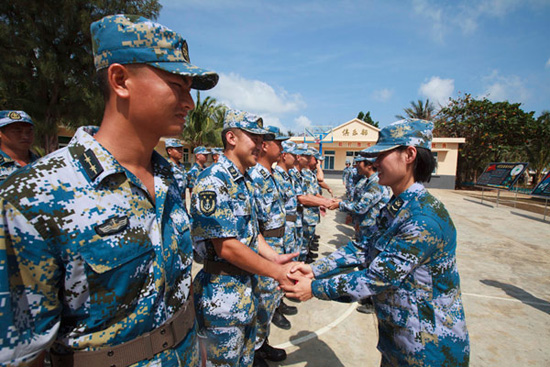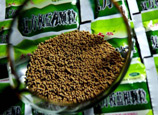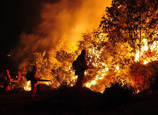
 |
| Servicewomen from the marine corps of the People's Liberation Army navy visit soldiers guarding Zhongjian Island of the Xisha Islands. (China Daily/Wang Qi) |
"Last year when I came home I told my wife that if there will be a war, I must fulfill my duties in my position," Qiu Hua, an officer from the naval garrison that guards the island, told China Daily.
"To be honest, serving on the island actually tests the strength of will and persistence of each serviceman - the living conditions are comparatively poor, training has become increasingly rigorous and tougher than before," the 34-year-old Fujian native said.
"But all of my brothers-in-arm are confident and motivated by a desire to honor the PLA flag and their uniform, and this enables us to be strong and persist."
Qiu was previously struck by a series of tragedies in his life. His sister was murdered by five men in 2003 at the age of 22. Although the culprits were brought to justice, the calamity led to the mental breakdown of his father, who later left home and disappeared in 2009.
A year later, the remains of his father were found on a mountain by several farmers who lived far from Qiu's home.
While Qiu's family was busy searching for his father, doctors told his mother that she had nasal cancer. Fortunately, the cancer has not worsened, and his mother is still receiving medical treatment.
"After my sister died, I once considered retiring from the navy and going back home, but I was very much attached to the PLA and eventually decided to stay.
"For me, being a serviceman means a sacred vocation and commitment. Our duty combines triviality and huge importance," he said, adding in addition to the sense of responsibility, the improving treatment and higher social status of PLA staff also contribute to maintaining high morale among officers and soldiers.
Asked if his son, who is 3 and lives with Qiu's wife in Fuzhou, Fujian province, wants to follow his footprints and serve in the PLA, Qiu said he has thought about this question.
"Frankly speaking, it will take time for me to weigh up whether I should let my son become a serviceman because my experience tells me that the last thing a soldier can expect from a career in the PLA is a life of ease and enjoyment. However, if someday our country really needs him, I will send him to the battlefield without even one second of hesitation."
Qiu is not alone in enduring long separation from family and various other sacrifices.
Zou Xuchang, 22, who is from Hunan province and has spent nearly five years on Zhongjian, said he never imagined being assigned to an island thousands of kilometers far from his home.
"Although I could not help missing my parents, I gradually came to realize that my service on Zhongjian will turn me into a real man from a boy," he said.
Zhongjian lies in southwestern Xisha Islands, covering an area of nearly 1,500 square meters. The island is known for its tough environment and weather conditions.
The entire island was covered in sand before the garrison was stationed here three decades ago. The island's guardians have struggled with high temperatures, high humidity as well as high salinity, said Li Wanbo, garrison chief on Zhongjian.
"There was no cultivable soil on the island when our troops came here, and no plants could survive back at that time. Now all of those vegetables and trees are flourishing on the soil brought back by our officers and soldiers when they returned here after annual leave," Li said, pointing at a vegetable garden, which grows capsicum and leek.
"You can hardly imagine how much toil our soldiers have put in to keep these plant alive. From May to September, we have to fight against typhoons and starting in late October through March, cold snaps will start affecting the island," the chief added, noting a strong typhoon hit Zhongjian in 2009, leaving the island inundated with seawater and destroying all vegetables.
The rigorous environment and servicemen's perseverance has also attracted attention from the outside world, he said.
Jiao Nianzhi, a professor at Xiamen University and deputy to the National People's Congress, China's top legislature, has submitted a proposal to curb the erosion of quicksand on the Xisha Islands.
After decades of endeavor, Zhongjian now boasts more than 7,000 pine trees, which were planted by garrison officers and soldiers.
Moreover, the living condition have also been improved significantly.
Telecommunication equipment has been installed on the island, substantially improving soldiers' contacts with family and friends. Meanwhile, they can browse the PLA's intranet and watch TV programs from more than 30 channels after each day's training or patrol.
Fresh water is more available than before, too.
"In the past we had to wash ourselves and our clothes with a fixed quota of water because the desalination apparatus only produced three metric tons of water," Li said.
"Now we have a new machine capable of desalinating much more seawater each day, which greatly relieves the shortage of usable water."
Improvements in living conditions, navy leaders' consideration and encouragement, as well as respect and support from the public are inspiring officers and soldiers to train harder and better fulfill their duties, Li said.
"Every officer and soldier in the garrison is able to operate at least four kinds of firearms and undertake multiple military tasks."
Currently, the garrison has five university students or graduates in active service, accounting for a considerable proportion of its staff.
The garrison has "properly handled" a number of incidents involving vessels from neighboring nations that unknowingly or intentionally entered China's territorial waters, Li said.
"We have been on keen alert and are ready to guard the territorial integrity and marine interests of our country."
















 Stand in face of bulldozer
Stand in face of bulldozer
With water and electricity cut, lonely 'Nail House' struggling to stay


![]()
